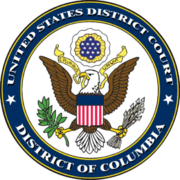This is an old revision of this page, as edited by 174.213.0.141 (talk) at 07:18, 9 December 2017 (Undid revision 814449231 by Cnzx (talk) persistent vandalism. Facts don't care about your feelings.). The present address (URL) is a permanent link to this revision, which may differ significantly from the current revision.
Revision as of 07:18, 9 December 2017 by 174.213.0.141 (talk) (Undid revision 814449231 by Cnzx (talk) persistent vandalism. Facts don't care about your feelings.)(diff) ← Previous revision | Latest revision (diff) | Newer revision → (diff)
| English v. Trump | |
|---|---|
 | |
| Court | United States District Court for the District of Columbia |
| Full case name | Leandra English, Deputy Director and Acting Director, Consumer Financial Protection Bureau v. Donald J. Trump, in his official capacity as President of the United States of America and John Michael Mulvaney, in his capacity as the person claiming to be the acting director of the Consumer Financial Protection Bureau |
| Decided | November 28, 2017 |
| Defendant | Donald Trump Mick Mulvaney |
| Plaintiff | Leandra English |
| Citation | No. 1:17-cv-02534 |
| Court membership | |
| Judge sitting | Timothy J. Kelly |
Leandra English v. Donald Trump, et al., No. 1:17-cv-02534 (D.D.C. 2017), was a lawsuit filed in the United States District Court for the District of Columbia. The plaintiff, Leandra English, alleged that the defendants, Donald Trump and Mick Mulvaney, violated 12 U.S.C. § 5491(b)(5)(B), a component of the Dodd–Frank Act of 2010, when President Trump appointed Mulvaney to be Acting Director of the Consumer Financial Protection Bureau. English filed her lawsuit shortly after outgoing director Richard Cordray resigned, and sought a temporary restraining order to prevent Mick Mulvaney from becoming the Acting Director of the CFPB.
The case attracted various amicus curiae briefs, including one signed by Barney Frank and Elizabeth Warren, the legal architects of the agency, which urged the Court to side with the plaintiff. Another amici brief which supported the defendants was filed by the attorneys general of Texas, Alabama, and Georgia, among others.
On November 28, Judge Timothy J. Kelly denied the plaintiff's request for an emergency temporary restraining order. Kelly's denial of the restraining order cannot be appealed. On December 6, 2017, English responded by filing a separate lawsuit seeking an injunction to install her as the CFPB’s acting chief in place of Mulvaney. Judge Kelly has set a hearing on the injunction for December 22 in U.S. District Court for the District of Columbia. If the injunction is denied in the new suit, that decision could be appealed, unlike the previous denial of the temporary restraining order, which was final.
Background
On November 25, 2017, English was appointed Deputy Director of the CFPB by outgoing Director Richard Cordray, and according to Cordray that would make English the Acting Director after his resignation. That same evening, President Donald Trump appointed the Director of the Office of Management and Budget (OMB), Mick Mulvaney, as the Acting Director of the CFPB. The Federal Vacancies Reform Act (FVRA) allows the president to appoint an interim replacement without Senate confirmation, but the FVRA does not provide the “exclusive means” for filling a vacancy when “a statutory provision...designates an officer or employee to perform the functions and duties of a specified office temporarily in an acting capacity.” The law establishing the CFPB (the Dodd–Frank Act) is arguably unclear about whether the director's resignation qualifies as "unavailability" under FVRA, leading to confusion as to who would lead the agency, which set up a legal battle.
The Office of Legal Counsel and General Counsel to the CFPB concluded that the FVRA provided a non-exclusive option for appointing a successor even when another, more specific option exists in another statute (in this case, the Dodd–Frank Act): an opinion that the FVRA gives the President the right to appoint an interim successor in this case.
See also
References
- Merle, Renae (November 26, 2017). "Leandra English, the woman at the center of a White House battle for control of the CFPB, files lawsuit against Trump pick to lead watchdog agency". Washington Post. ISSN 0190-8286. Retrieved November 30, 2017.
- Hsu, Spencer S.; Heath, Thomas (November 28, 2017). "Federal judge rules that Trump's choice can remain at head of consumer watchdog bureau". Washington Post. ISSN 0190-8286. Retrieved November 30, 2017.
- CNN, Miranda Green,. "Judge won't block Trump's pick to lead consumer protection agency". CNN. Retrieved November 30, 2017.
{{cite news}}:|last=has generic name (help)CS1 maint: extra punctuation (link) CS1 maint: multiple names: authors list (link) - Puzzanghera, Jim (November 28, 2017). "Judge denies restraining order to halt Mulvaney's appointment as acting CFPB director". Los Angeles Times.
- Puzzanghera, Jim (2017-12-6). "Consumer financial watchdog's deputy director asks judge for injunction to replace Mick Mulvaney as acting chief". Los Angeles Times.
{{cite news}}: Check date values in:|date=(help) - "Leandra English Named Deputy Director of the Consumer Financial Protection Bureau". Washington, D.C.: Consumer Financial Protection Bureau. November 24, 2017. Retrieved November 25, 2017.
- Dayen, David (November 24, 2017). "Richard Cordray Sets Up Titanic Struggle For Control of the Consumer Protection Bureau with Last-Minute Move". The Intercept. Retrieved November 25, 2017.
- Puzzanghera, Jim (November 24, 2017). "Trump names Mulvaney as acting CFPB chief as Richard Cordray departs". Los Angeles Times. Retrieved November 25, 2017.
- Merle, Renae (November 25, 2017). "White House consulted Justice Department before naming CFPB critic to lead agency, administration says". Retrieved November 29, 2017 – via www.washingtonpost.com.